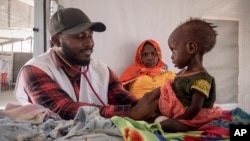A United Nations-backed food security report concluded Thursday that more than a year of war in Sudan has pushed parts of North Darfur into famine, including a displaced persons camp that houses more than a half-million people.
"According to the report, catastrophic hunger conditions are projected for the first time in the history of the IPC survey in Sudan, and 14 areas have been declared 'at risk of famine' in the coming months," U.N. spokesperson Stephane Dujarric told reporters about the Integrated Food Security Phase Classification, the global monitor for food insecurity.
The IPC does not declare famine but provides the evidence for an official declaration to be made.
The IPC says famine conditions are prevalent in North Darfur, including at the Zamzam displacement camp, which is about 12 kilometers (7 miles) south of the regional capital, El Fasher, and are likely to persist through the end of October.
The U.N. says intensified fighting in El Fasher has displaced about 320,000 people since mid-April, with about 150,000 to 200,000 of them believed to have moved to Zamzam camp since mid-May. It says the camp population has expanded to over half a million in just a few weeks.
Fighting between rival generals leading the paramilitary Rapid Support Forces and the Sudanese Armed Forces for the past 15 months has severely hindered humanitarian access, exacerbating the hunger crisis.
In addition to the areas facing famine, the U.N. warns that half the country's population — about 25.6 million people — are at crisis levels or worse of food insecurity.
Dujarric said the World Food Program is rapidly increasing its emergency response and trying to find new ways to reach millions of people across Sudan, especially in hard-to-reach areas.
"Our colleagues at WFP are telling us that we are in a race against time to stop famine in its tracks," Dujarric said. "But there is an urgent need for a massive increase in funding to ramp up assistance at the scale required to avert famine."
The United Nations has appealed for $2.7 billion this year for Sudan but has received about a third of that — $870 million.
"We and our partners warn that if the war doesn't stop, more and more people are being pushed into catastrophic levels of hunger," Dujarric said.
Nongovernmental organization Mercy Corps said the IPC famine report is "merely the tip of the iceberg."
"We can only imagine the extent of starvation and deprivation in other regions where we lack similar data, particularly in the 14 areas identified in the latest IPC report, including Greater Darfur, the Kordofan areas, and Khartoum State," Barrett Alexander, Mercy Corps' director of programs for Sudan, said in a statement.
He said a recent assessment by his team in Central and South Darfur found that 9 out of 10 children, particularly those under age 5, are suffering from life-threatening malnutrition.
On Monday, the U.N. Security Council expressed its concern about the humanitarian situation, urging the international community to increase assistance.
On July 18, the United States announced an additional $203 million in humanitarian assistance to support those affected by the conflict both inside Sudan and those who have fled to neighboring countries.
U.S. Ambassador to the United Nations Linda Thomas-Greenfield said the IPC report confirms what was known already — that people have been and continue to die in Sudan from starvation.
"Families who fled horrific violence have been going hungry for months," she said in a statement. "Children have been eating dirt and leaves, and every day, babies have been starving to death."
She urged the warring parties to attend the cease-fire talks in Switzerland on August 14, which the United States is mediating, and Switzerland and Saudi Arabia are co-hosting.
